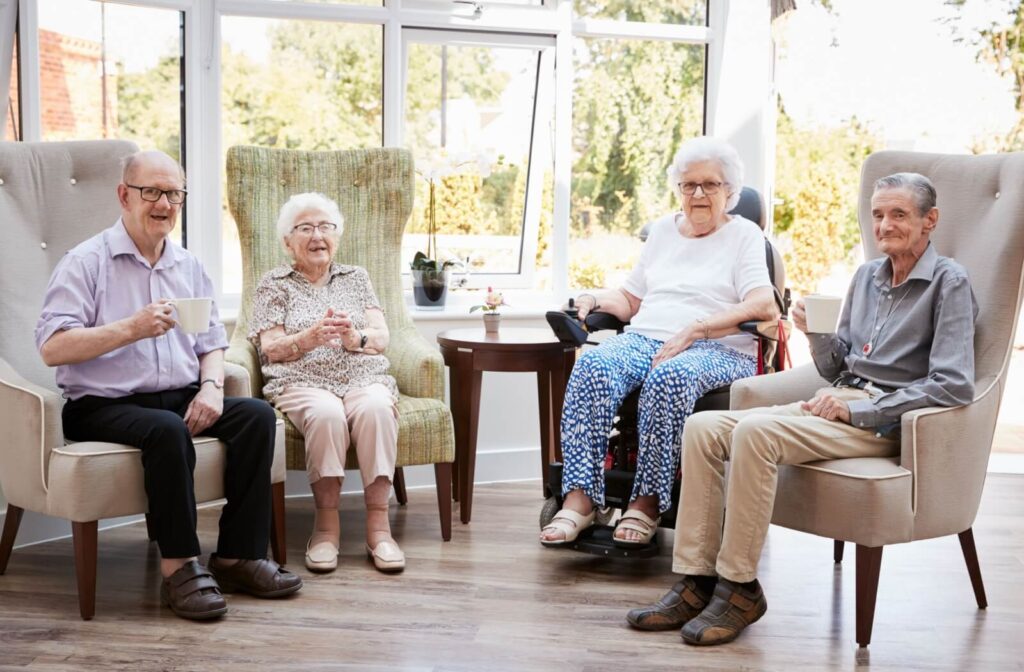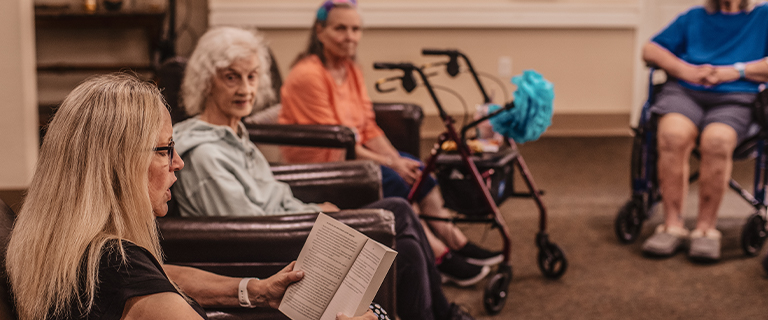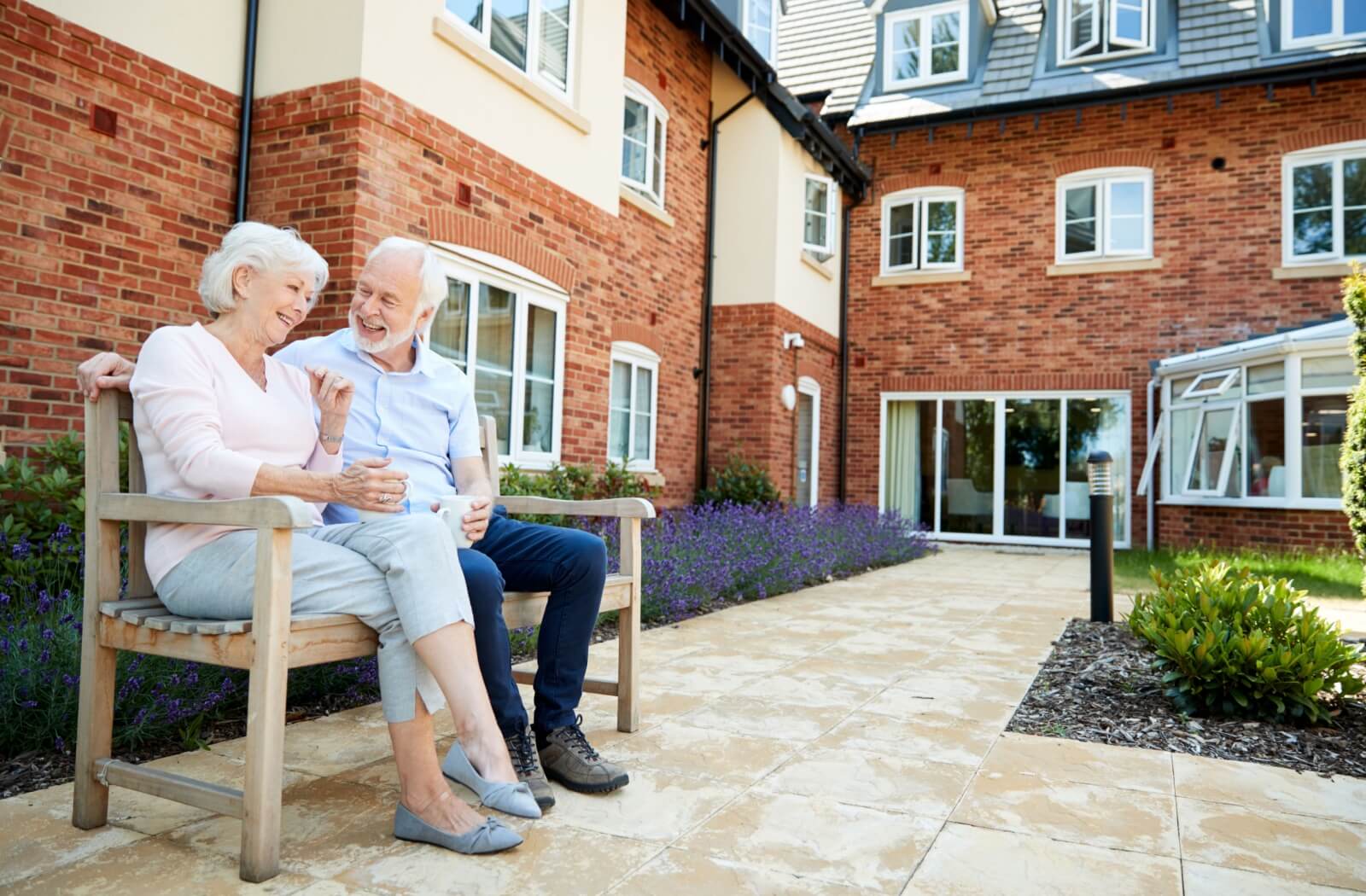As you consider your loved one’s next steps, you’re probably considering all your options. Aging in place doesn’t always refer to staying at home—it can mean living in a senior living community where lifestyle options are tailored to your unique needs and can change over time.
A senior residence is a community designed to cater to the needs of older adults and provide a safe, supportive, and engaging environment. It can enhance quality of life by offering not just necessary support but also opportunities to connect and build lasting friendships. It’s a place to enjoy activities, maintain independence, and feel a sense of belonging.
These communities typically offer various levels of care so residents can receive the right level of assistance as their needs change over time.
Senior Living Options
Senior residences are more than just places to live. They’re vibrant communities where you can continue to enjoy your hobbies, cherish your independence, and feel a profound sense of belonging.
They’re designed to adapt alongside you and offer different levels of support to match your needs as they change. Whether you need minimal assistance or more comprehensive care, a range of options is often available—from independent living spaces to assisted living services and specialized memory care.
Independent Living
Independent living is ideal for those who value their autonomy but appreciate the convenience of on-site support services. These communities offer amenities like housekeeping, transportation, and social activities and allow residents to simplify their lives, engage with like-minded peers, and spend their days how they want.
Assisted Living
Assisted living broadly refers to supporting older adults who prefer to live independently but need help with their activities of daily living (ADLs), such as bathing, dressing, and medication management. Assisted living can offer higher levels of care while maintaining the individual’s autonomy.
Memory Care
Memory care offers specialized care to those with Alzheimer’s, Parkinson’s, and other forms of dementia. They provide a secure environment with specially trained staff, ensuring residents receive the personalized attention, support, and engagement for a fulfilling, happy life.
Memory care focuses on enhancing cognitive function, maintaining routines, and providing emotional support for residents and their families.

What to Look For in a Senior Residence
When choosing a senior residence for a loved one, be sure to look for:
- Safety & security: The community should be thoughtfully designed, with safety as a priority. They should offer features such as emergency call systems, which allow residents to summon help in an emergency; secure entryways that prevent unauthorized access and ensure the safety of all residents; and 24/7 staff availability to address any issues, helping ensure the well-being and peace of mind of residents and their families.
- Social engagement: Senior communities should offer opportunities for social interaction and connection. Look for organized group activities and events, like fitness classes, art workshops, game nights, excursions, and cultural events. Shared spaces—like communal lounges and dining areas—should be designed to facilitate socialization, combat loneliness, foster friendships, and promote mental well-being among residents.
- Personalized care: Look for communities that offer varying levels of care, which can be customized to meet each resident’s unique physical and emotional needs. A personalized approach ensures that residents receive the proper support, whether they need assistance with daily activities, medication management, or more intensive medical care. Care plans should be adjusted to provide appropriate support as needs change over time.
- Peace of mind: Choose a community that offers stability and peace of mind. Knowing that a loved one is in a supportive and caring environment is invaluable. This assurance allows caregivers to focus on nurturing their relationship with their loved ones without the stress and demands of caregiving. Peace of mind from knowing that a family member is safe, engaged, and well-cared for is vital when choosing a senior residence.
When to Consider a Senior Living Community
The transition to senior living with a loved one can be a delicate process that requires sensitivity, empathy, and open communication. By listening to your loved one’s feelings, sharing your own concerns, and focusing on the positive aspects of this change, you can navigate these complex emotions together.
Some indicators that your loved one may want to consider transitioning to a senior residence could include:
- Changes in health or mobility: One of the clearest signs is a noticeable change in health or mobility. This could be increased falls, difficulty managing daily tasks, or frequent hospital visits. If safety and well-being are compromised, senior living communities can offer the necessary support and care.
- Challenges with household management: Are tasks like cooking, cleaning, or yard work becoming overwhelming? Senior communities often provide maintenance-free living, allowing residents to focus on activities they enjoy.
- Social isolation: Social connections are vital for mental and emotional health. If you or a loved one spends more time alone or struggles to engage with friends and community activities, senior living can offer vibrant social opportunities and companionship.
- Memory concerns: For those experiencing early signs of memory loss or dementia, an environment designed to support cognitive health may be beneficial. Many senior living communities provide specialized memory care with trained staff to ensure safety and engagement.
How to Talk to Your Loved One About Moving
Several strategies can facilitate your conversation and streamline the decision-making process.
Starting Early
Initiating the conversation before necessary will give you time to explore available options without pressure of urgency. A proactive approach can help ensure everyone is involved in making well-informed decisions together.
Listening Actively
Listening is key. Pay attention to your loved one’s feelings and concerns. Understanding their perspective will help you address their fears about moving and provide reassurance about the benefits and care available in senior living.
Sharing Your Concerns
It can be tough to broach the subject of senior living, but open and honest communication is key. Share your concerns about your loved one’s safety and well-being. Explain how you’ve noticed changes in their ability to manage daily tasks or how worried you are about their living situation.
Remember, your goal isn’t to scare them but to have a heartfelt conversation about their future. By being open and understanding, you can work together to find a solution that ensures their happiness and peace of mind.
How Parsons House Preston Hollow Can Help
As a family-owned community, Parsons House Preston Hollow is committed to providing the same quality care we would our own family. Our team is compassionate, knowledgeable, and experienced. They exceed our expectations every day and craft dynamic care plans that change with our residents.
From daily activities to chef-prepared meals, a fitness center, lush, landscaped grounds, an on-site dog park, and visiting student volunteers, our community is designed to serve our elders and offer unconditional love. Our mission is to nurture personal growth, celebrate life, and make a difference. If that sounds like what you’re looking for, join us for a tour today. We would love to meet you.



